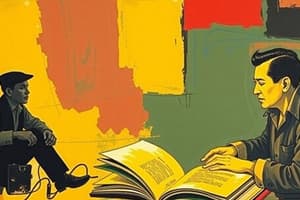Podcast
Questions and Answers
What was the outcome of Villa's rebellion against the Euro-Hispanic tradition?
What was the outcome of Villa's rebellion against the Euro-Hispanic tradition?
- It led to the rise of the Pialism tradition
- It started the Anglo-American literary tradition in the Philippines (correct)
- It led to the decline of the Euro-Hispanic tradition
- It made the Propaganda Movement more influential
What was the impact of the Propaganda Movement on Filipino literature?
What was the impact of the Propaganda Movement on Filipino literature?
- It led to the rise of the Anglo-American tradition
- It emphasized the importance of social roots in literary works
- It made literature more accessible to the masses
- It deepened the roots of Filipino writers in the Euro-Hispanic tradition (correct)
Who are the two towering literary figures mentioned in the text?
Who are the two towering literary figures mentioned in the text?
- Amado V. Hernandez and Lazaro M. Francisco (correct)
- Villa and Lopez
- Balagtas and Rizal
- Mabini and Quezon
What literary tradition did Villa's example start?
What literary tradition did Villa's example start?
What was the outcome of the 'Villa-Lopez controversy'?
What was the outcome of the 'Villa-Lopez controversy'?
What was the result of the rise of the English-intelligentsia?
What was the result of the rise of the English-intelligentsia?
What was the focus of the Euro-Hispanic tradition?
What was the focus of the Euro-Hispanic tradition?
Who is likely to occupy an eminent place in the history of the Filipino novel?
Who is likely to occupy an eminent place in the history of the Filipino novel?
What was the outcome of the Depression years on literary ideas?
What was the outcome of the Depression years on literary ideas?
What was the result of the post-war years on the literary scene?
What was the result of the post-war years on the literary scene?
Study Notes
Literature under U.S. Colonialism (1898-1945)
- The taga-bayan-taga-bukid polarization in Philippine society took on a political color during the Revolution of 1896.
- The Revolution of 1896 led to the leadership of the ilustrados, who favored education as a requirement for leadership, which ultimately benefited the Filipino native elite.
- The ilustrados, who owed intellectual and emotional allegiance to the colonizers' culture, prioritized their own interests over those of the unlettered and unpropertied populace.
Taga-bayan and Taga-bukid Culture
- Taga-bayan culture, a colonial creation, was characterized by intellectual and emotional allegiance to the culture of the colonizers.
- Taga-bukid culture, on the other hand, was more connected to the masses and patriotic pride.
Theater and Nationalist Struggle
- The nationalist struggle led to the development of sarswela, a form of theater that depicted scenes from Philippine life.
- The komedya, a form of theater that presented distant cultures and times, was seen as less relevant to the nationalist struggle.
- Allegory was used by nationalist dramatists to convey abstract messages and promote patriotic pride.
Notable Literary Works
- Tanikalang Guinto (1902) by Juan Abad is a play that stands for freedom and the Filipino.
- Iñigo Ed. Regalado's novels, such as May Pagsinta'y Walang Pu (1911), examined the emotional and intellectual responses of women in a patriarchal society.
- Ang Pangginggera (1911) by Santos is a novel that critiques the pessimism of naturalist views of human fate.
Literary Traditions
- The Euro-Hispanic tradition was subsumed into a truly indigenous tradition of Filipino literature.
- The Pialism tradition, which emerged during this period, emphasized the social roots of literary work.
- The Villa-Lopez controversy in the 1930s pitted literary theory against the Euro-Hispanic tradition.
- The Angestheticism tradition, which emerged in the 1930s, was influenced by leftist American intellectuals.
Notable Literary Figures
- Amado V. Hernandez and Lazaro M. Francisco are two towering literary figures whose careers date back to the period of U.S. colonialism.
- Lazaro M. Francisco is likely to occupy an eminent place in the history of the Filipino novel.
Studying That Suits You
Use AI to generate personalized quizzes and flashcards to suit your learning preferences.
Description
This quiz covers the literary landscape of the Philippines during the U.S. colonial period from 1898 to 1945. It explores the polarized society, the role of education and wealth, and the leadership of the revolution. Test your knowledge of this significant era in Philippine history!




